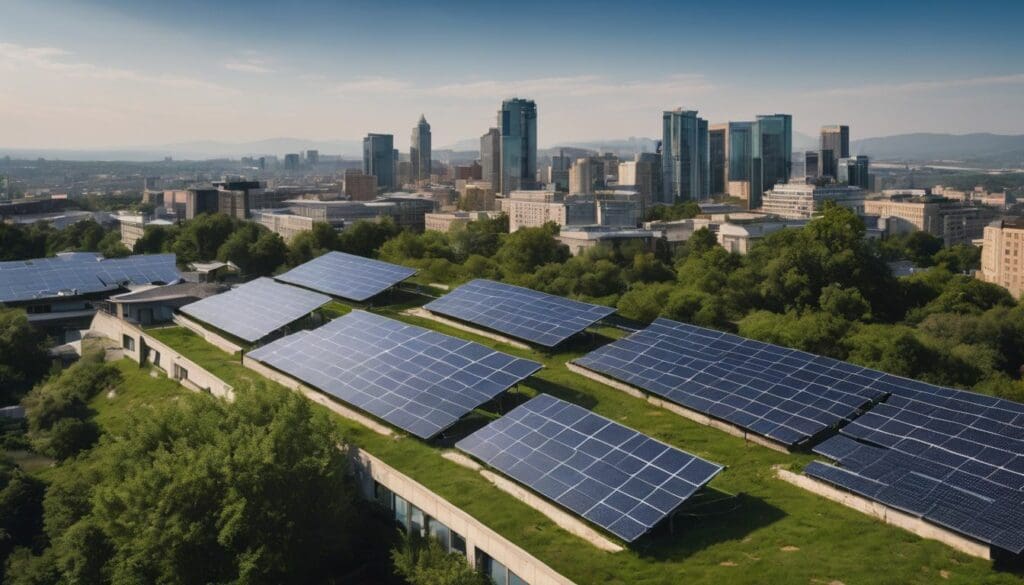Rising energy bills and the threat of climate change have us all looking for better ways to power our lives. Did you know that local governments can be powerhouse champions for sustainable energy? This blog post will explore how your town or city can light the way towards a greener future, making cleaner energy not just possible but practical.
Get ready to discover local solutions sparking global changes!
Key Takeaways
- Local governments hold the power to change energy use by making decisions and setting rules that encourage clean renewable energy projects in their communities.
- By putting money into things like solar panels, creating jobs in green businesses, and teaching people about eco-friendly energy, towns can enjoy cleaner air and become less reliant on fossil fuels.
- Innovative financing like Energy Performance Contracting (EPC) lets councils make improvements without spending lots up front, so they can work towards sustainability without hurting their budgets.
- In Poland, city leaders have shown how well these efforts work by starting renewable energy plans that other places can learn from to increase their own use of clean energy.
- To keep moving towards a future with more sustainable energy, local governments need to develop new climate policy leaders and make sure everyone has access to the tools and information they need for this transformation.
The Importance of Local Governments in Driving the Transition to Sustainable Energy
Local governments play a crucial role in driving the transition to sustainable energy by implementing renewable energy solutions and modernising infrastructure, contributing to climate goals and environmental sustainability.
The benefits of promoting sustainable energy at the local level are significant, including energy security and clean energy projects that benefit communities.
Understanding the role of local governments
Local governments play a pivotal part in steering communities towards sustainable energy solutions. They are on the front lines, making key decisions that shape the energy landscape of cities and towns.
By crafting policies and regulations to encourage renewable energy projects, they can directly influence how quickly a community reduces its carbon footprint.
Municipalities have unique powers to modernise infrastructure, bolster public transportation systems, and invest in clean technology. Engaging citizens about the benefits of renewable sources helps foster social acceptance for green initiatives.
Local leaders can secure funding for eco-friendly projects, creating jobs while enhancing environmental policy and meeting climate action goals. Their efforts ensure that sustainability is woven into the fabric of local development, safeguarding both resources and energy security for future generations.
Benefits of promoting sustainable energy at the local level
- Reducing carbon emissions and mitigating climate change effects through the use of renewable energy sources.
- Creating new job opportunities in the clean energy sector, contributing to local economic growth and stability.
- Enhancing energy security by diversifying energy sources and reducing dependence on non-renewable resources.
- Improving public health by decreasing air and water pollution associated with traditional energy production methods.
- Strengthening community resilience against extreme weather events and natural disasters by integrating sustainable energy infrastructure.
Strategies for Local Governments to Promote Sustainable Energy
Local governments can promote sustainable energy by implementing renewable energy solutions, modernising infrastructure, and achieving budget neutrality with EPC funding. These strategies play a crucial role in driving the transition to clean and renewable energy at the local level.
Implementing renewable energy solutions
Local governments play a crucial role in implementing renewable energy solutions. By investing in solar panels, wind turbines, and other clean energy sources, municipalities can reduce their carbon footprint. Moreover, by partnering with local businesses and organisations to develop sustainable energy projects, they can promote economic growth within the community.
- Investing in solar panels
- Partnering with local businesses to develop wind farms
- Encouraging the use of geothermal energy for heating and cooling systems
- Implementing policies to incentivise the adoption of electric vehicles
- Collaborating with schools to educate students on the benefits of renewable energy
- Offering grants and subsidies for residents who install solar panels on their homes
- Establishing community – wide recycling programs to reduce energy consumption
Modernising infrastructure
Local governments play a crucial role in modernising infrastructure to support sustainable energy initiatives. Upgrading public buildings, street lighting, and transportation systems with energy-efficient technologies not only reduces carbon emissions but also lowers operational costs.
By investing in smart grid technology and expanding renewable energy sources like solar panels, local authorities can create resilient and eco-friendly infrastructure that benefits the community while promoting clean energy adoption.
Revamping infrastructure allows local governments to lead by example, demonstrating their commitment to sustainability and inspiring residents and businesses to follow suit. Additionally, upgrading outdated systems with modern technology aligns with climate goals and fosters economic growth by creating jobs in the clean energy sector.
Budget neutrality with EPC funding
Local governments can achieve budget neutrality in sustainable energy initiatives through Energy Performance Contracting (EPC) funding. This innovative financial mechanism allows local authorities to implement energy-efficient projects without upfront costs.
EPC funding provides the necessary capital for modernising infrastructure and transitioning to clean energy solutions while ensuring fiscal responsibility. By leveraging this approach, municipalities can optimise their environmental infrastructure and meet climate goals without straining their budgets.
To ensure that clean energy transitions are financially feasible at the local level, it’s essential for environmentally conscious individuals to understand the potential of EPC funding in promoting sustainable energy initiatives.
The Impact of Local Government Support on Renewable Energy Adoption
Municipalities in Poland have successfully implemented renewable energy projects with the support of local governments, showcasing the positive impact of such initiatives on renewable energy adoption.
Case study: Municipalities in Poland
Municipalities in Poland have made significant strides in promoting sustainable energy solutions. By implementing renewable energy projects and enhancing energy efficiency, these local governments are leading the way in the clean energy transition.
Through innovative funding options and modernising infrastructure, they are setting an example for other towns and cities worldwide.
These municipalities are not only meeting their climate goals but also addressing equity gaps and workforce needs through their sustainable development initiatives. By fostering social acceptance of clean energy technologies and promoting consumer awareness, they are creating eco-friendly communities that serve as models for others to follow.
Addressing Challenges and Fostering Progress
Local governments can address challenges and foster progress by enhancing technical assistance, promoting consumer awareness, and addressing equity gaps and workforce needs. These efforts will help drive the transition to sustainable energy at the local level.
Enhancing technical assistance
To support the transition to sustainable energy, local governments can enhance technical assistance by providing training programmes for residents and businesses. This technical assistance ensures that everyone has the knowledge and resources to adopt renewable energy solutions effectively.
By offering workshops and educational materials on clean energy technologies, local authorities empower their communities to make informed choices about sustainable energy options.
Furthermore, technical assistance can also include guidance on navigating permits, standards compliance, and accessing financial incentives for renewable energy projects.
As local governments work towards promoting sustainable energy, enhancing technical assistance is crucial in helping individuals and businesses embrace eco-friendly initiatives at the grassroots level.
Promoting consumer awareness
Local governments play a crucial role in promoting consumer awareness of sustainable energy solutions. They can educate residents about the benefits of clean energy and encourage them to adopt eco-friendly practices in their daily lives.
By providing information on renewable energy incentives and programs, local authorities empower consumers to make environmentally conscious choices that contribute to a cleaner and greener future for their communities.
Furthermore, through targeted campaigns and workshops, local governments can raise awareness about the importance of energy conservation and efficiency. This proactive approach fosters a culture of sustainability at the grassroots level, inspiring individuals to embrace eco-friendly initiatives while contributing to the overall goal of reducing carbon emissions and building resilient communities.
Addressing equity gaps and workforce needs
- Offering training programmes and apprenticeships to local residents, especially from marginalised communities, to develop a skilled workforce for renewable energy projects.
- Collaborating with educational institutions to create tailored courses in clean energy technologies, providing opportunities for individuals to gain expertise in this field.
- Partnering with community organisations to identify and address specific barriers faced by minority groups in accessing clean energy resources.
- Implementing fair hiring practices within the local government and its associated contractors, ensuring opportunities for all members of the community.
- Establishing mentorship programmes that connect experienced professionals in the clean energy sector with aspiring individuals from diverse backgrounds.
- Creating outreach campaigns targeting underrepresented populations to raise awareness about careers in sustainable energy and provide guidance on available resources.
The Future of Local Governments in Promoting Sustainable Energy
Local governments will play a crucial role in building state and local climate capacity, as well as developing the next generation of climate policy leaders. This will ensure that sustainable energy initiatives continue to grow and evolve for the benefit of all communities.
Building state and local climate capacity
Local governments play a crucial role in building state and local climate capacity. They are at the forefront of implementing policies and initiatives that drive the transition to sustainable energy.
By developing comprehensive strategies, they can create an environment conducive to renewable energy adoption and foster a culture of sustainability within their communities. This entails engaging with stakeholders, investing in clean energy infrastructure, and promoting education on eco-friendly practices.
Through these efforts, local governments can lead the way in addressing climate goals and fostering progress towards a more sustainable future.
Developing the next generation of climate policy leaders
Local governments play a pivotal role in developing the next generation of climate policy leaders. By investing in education and training programmes focused on sustainable energy, they empower future leaders to drive environmental change at the local level.
This involves providing mentorship, internships, and educational opportunities to equip individuals with the knowledge and skills needed to develop and implement innovative clean energy policies.
Empowering the next generation fosters an environment where fresh ideas can flourish and new solutions can be brought forth. Through specialised training initiatives, individuals are prepared to take on roles within local government that drive sustainable energy practices forward.
Conclusion
Local governments play a pivotal role in promoting sustainable energy, driving the transition to clean and renewable sources. Embracing eco-friendly initiatives, implementing budget-neutral solutions, and fostering awareness are key actions that can drive impactful change at the local level.
By focusing on building climate capacity and nurturing future climate policy leaders, local governments pave the way for a greener and more sustainable future.
Supporting conservation efforts through strong local government action is essential for achieving environmental goals and ensuring a cleaner, more sustainable tomorrow. The significance of town-level political and economic aspects of green energy cannot be overstated.
FAQs
1. What actions can local governments take to support sustainable energy?
Local governments play a role in promoting clean energy by launching sustainability initiatives, supporting renewable energy implementation, and encouraging eco-friendly practices within communities.
2. Why is it important for municipalities to embrace sustainable energy solutions?
Embracing sustainable energy solutions helps municipalities meet climate goals, contribute to the clean energy transition at the local level, and provide public goods that benefit both the environment and residents.
3. How does renewable energy benefit towns on a political and economic level?
At the town level, adopting renewable energy can lead to green municipalities with stronger economies and enhanced political standing through leadership in community-based sustainable practices.
4. Can local government action really influence widespread adoption of clean energies?
Yes! Local government’s role in deploying ecofriendly initiatives like community energy projects sets an example that encourages broader participation in the move towards a more sustainable future.





